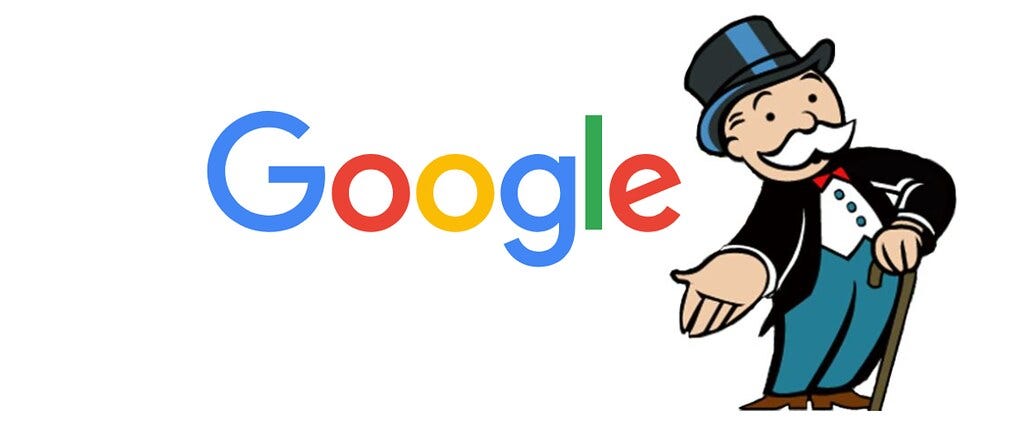One of the last, best hopes for saving the open web and a free press is dead
The Google ruling is a disaster. Let the AI slop flow and the writers, journalists and creators get squeezed.
Greetings all,
Hope everyone in the states who got to take a long weekend enjoyed the respite. I did my best to do exactly that—spent a few days with some old friends in a cabin off the grid, even—and I’m quite glad I did. Even if it means I didn’t get around to writing my annual-ish Labor Day in tech post. I guess last year’s will have to suffice:
Now, I had resolved to channel the energies of that somewhat rested mind into writing something on a hopeful subject for a change, but all that went out the window as soon as I saw Judge Amit Mehta’s ruling on Google. At the risk of being hyperbolic, I think this is a disaster on a scale that’s not yet been fully absorbed. As usual, there’s simply too much going on, and an antitrust case ruling with a somewhat ambiguous-sounding resolution might not exactly leap out of the news cycle. But it’s hard to overstate how bad it is, at least for anyone concerned about a rapidly degrading internet, the free press, or the open web.
As always, I need to note that Blood in the Machine is made possible entirely by my exceptional readers, who studies have shown to possess the highest Voight-Kampff scores on the internet, and some of whom donate the equivalent of a cheap beer a month so I can keep this project running. A huge thanks to all of you who already support this work, I’m immensely grateful. If you’re a regular reader who can chip in, I’d love your support, too. BITM is a significant undertaking, and I’d love to be able to expand what I do here. For those who’d prefer to support me elsewhere, I have a Ko-fi page. Okay okay—onwards.
Let’s back up for a minute to get the whole picture: Just over a year ago, in August 2024, Mehta, an Obama-appointed judge, ruled that Google was a monopolist, and had acted illegally to maintain its market dominance in online search. This was a major decision, the rare and genuinely encouraging ruling that promised to finally hold the impossibly consolidated tech giants accountable. Google’s monopoly on search has, of course, over the past decade-and-a-half, had a profound impact on our digital infrastructure.
And the ruling came at a time when that impact was being acutely felt: The internet was rapidly becoming overloaded with AI slop, while social media and search engines alike were burying original links to reported news and independent publications. Platforms had consolidated their power over our information distribution systems, and were leveraging it with bets on AI—whether the consumers or web users liked it or not.
Google, of course, was one of the worst actors. It controlled (and still controls) an astonishing 90% of the search engine market, and did so not by consistently offering the best product—most longtime users recognize the utility of Google Search has been in a prolonged state of decline—but by inking enormous payola deals with Apple and Android phone manufacturers to ensure Google is the default search engine on their products.

Google paid Apple $20 billion a year to ensure it runs the default search engine on Safari. Google paid Samsung $8 billion over four years to make sure Search, the Play app store, and Google’s voice assistant came loaded by default on Samsung devices. Between those two deals alone, over the last five years, Google has paid one hundred and eight billion dollars to make sure its search product is distributed through the widest possible channels, and, of course, that no other search engine gets a shot. It’s hard to imagine a less competitive business practice than all this.
And yet. After Mehta’s initial ruling, the Department of Justice suggested a raft of good and aggressive proposals that would have effectively broken Google’s obvious monopoly: Ending the pay-to-play practice for prime search placement on Safari. Forcing Google to sell off Chrome, the web browser that comes pre-loaded with its search product, and regulating its Android mobile division. And so on—things that would meaningfully address Google’s status as a monopolist. Instead, in a truly baffling decision handed down this week, Mehta ruled that Google didn’t have to do any of that. Instead, it had to share “some” search data with “qualified competitors” and make its payola contracts non-exclusive. It can still do them, they just can’t be exclusive.
The decision, handed down in the U.S. District Court for the District of Columbia, will force Google to share some search data with its competitors and put some restrictions on payments that the company uses to ensure its search engine gets prime placement in web browsers and on smartphones. But it fell far short of government requests to force it to sell its popular Chrome browser and share far more valuable data.
It was a measured approach that signaled judicial reluctance to intervene too deeply in fast-changing, high-tech markets.
That’s putting it lightly. There would be no ban on payola, just some constraints on the length of contracts, only limited data sharing, and no regulation of Android.
After the ruling, Wall Street, Google, and Apple rejoiced. Google shares skyrocketed, ultimately rising 9%, adding $230 billion in value, and reaching a historic high for the company. This was a best case scenario for Google and Big Tech, which now has a very handy precedent. Mehta declared Google a monopoly in 2024 and then decided that it could effectively continue to operate as one in 2025. As antitrust writer Matt Stoller put it, “this decision isn’t just bad, it’s virtually a statement that crime pays.”
It fails entirely to address the root of the issue, and is confounding in its logic to boot. Mehta argues depriving Apple of Google’s $20 billion annual payday for keeping a rival’s product pasted onto its own may hamper Apple’s ability to innovate, for instance. And he seems to think that forcing Google to share some of its search data with competitors—at a price Google names—will open up the search market. This seems patently absurd to me. The problem isn’t that competitors don’t have good enough data or ideas to compete, the problem is that no competitor can afford $22 billion a year to buy product placement on the most important devices on the market. The problem is very obviously not that Google has a stranglehold on innovation—it clearly does not—but that it wields unchecked power over the digital marketplace.
Just as frustratingly, Mehta argues that it’s no longer necessary to break up Google because AI companies now offer chatbot products. AI was clearly on his mind, and seems to have offered him an escape hatch if he was getting squeamish about a serious remedy. "There is more discussion of AI in the opinion than in the entire case until now," said Herbert Hovenkamp, a professor at the University of Pennsylvania's Carey Law School.
In this, we can observe once again the power of AI hype. For one thing, a chatbot is a different product category; for another, they do not meaningfully threaten search. For a frame of reference, according to the SEO analyst Rand Fishkin, Google handled 373 times more searches than ChatGPT in 2024. Even if all 1 billion ChatGPT user queries submitted to OpenAI’s at the time could be considered “searches” that would still amount to 1% of the search engine market share. According to some of the latest numbers, Google still controls some 89% of the search market. Still a towering monopoly, in other words.
Yet, as Stoller notes, Mehta nonetheless argues
that new companies like OpenAI had emerged to potentially challenge Google, and he didn’t want to, and I’m not kidding, hinder Google’s ability to compete with them. (“It also weighs in favor of “caution” before disadvantaging Google in this highly competitive space.”)…
Wild. The only reason that OpenAI could even attempt to do anything that might remotely be considered competing with Google is that OpenAI managed to raise world-historic amounts of venture capital. OpenAI has raised $60 billion, a staggering figure, but also a sum that still very much might not be enough to compete in an absurdly capital intensive business against a decadal search monopoly. After all, Google drops $60 billion just to ensure its search engine is the default choice on a single web browser for three years.
But I’m ultimately less interested in the absurd elements of the decision than the tragic ones. By failing to break up the monopoly he himself diagnosed, Mehta is leaving in place an entrenched rentier system that’s quite actually suffocating the free press and the open web.
Remember, Google AI Overview, perhaps the worst digital product ever to be thrust in front of billions of people—though it’s a crowded race, to be fair—persists largely thanks to Google’s monopoly. Search comes loaded on our phones and browsers, is integrated into all the other products we’ve been roped into over the years; it just is. Now Google AI Overview comes built-in, too. And Google AI Overview is a generational blight. It’s delivers bad, misleading, pilfered, and false answers to searches. It’s a truly corrosive force to the digital information ecosystem. Worse, it’s strangling independent publishers and news organizations. Since Google is, again, a massive monopoly, publishers utterly rely on it for distribution and discovery. Now that Google is presenting its top results through AI Overviews rather than indexed links, there’s been a disastrous plunge in click-through search traffic. One report put the decline as steep as 80%, and described the effects as “devastating.”
This is nothing less than an existential threat, in other words, to the livelihoods of the people who create original work and add new information to the world, since Google is currently most important information delivery system. Breaking up Google was thus one of the best hopes for rescuing the public internet from descending totally into a realm of unfettered slop and information decay. A good, non-extractive, non-predatory search engine would be a powerful counter to AI that frequently produces misinformation and reams of regurgitated text without citations. If only someone would make one and manage to get it onto the market.
By leaving Google’s monopoly effectively untouched, Mehta is not just abdicating his own stated legal duty, he’s condemning publishers, journalists, and creators to be squeezed mercilessly. He’s allowing the whole digital information ecosystem that Google controls to devolve into a fetid swamp. He’s declining to do anything at all to stop the reign of slop.
The judge pointedly decided not to address any of the above more surgically, either. Here’s Stoller again:
Mehta also rejected the smaller remedies. He said no to choice screens, and advertiser data access. There was no remedy for publishers who are victimized by being forced to allow Google to train on their content in order to appear in search. That free press crushed by Google’s bad behavior, well, they will now be further wrecked by Google’s AI Now summaries on its search page, without any resource. Mehta even declined to impose an anti-retaliation or self-preferencing ban.
The 2024 ruling that Google was an illegal monopoly was a glimmer of hope at a time when platforms were concentrating ever more power, Silicon Valley oligarchy was on the rise, and it was clear the big tech cartels that effectively control the public internet were more than fine with overrunning it with AI slop. That ruling suggested there was some institutional will to fight against the corporate consolidation that has come to dominate the modern web, and modern life. It proved to be an illusion.
Edited by Mike Pearl.
As always, trying to fix this mess falls to us, the users, the advocates, the activists, the workers, the organizers; the ordinary humans. I discuss a bit of this, as well as the AI bubble, the AI Killed My Job series, and how employers are using AI to degrade work in a chat with my old friend Paris on his show, Tech Won’t Save Us. You can listen to that here.
I might have sounded a bit despairing about the Google mess above—I was and am very mad—but there’s always hope. I was reminded of this when I visited a Rideshare Drivers United meeting in LA’s Koreatown last week. Drivers and gig workers are organizing to support a new CA law that would restore their right to unionize, and I have to tell you, the energy in that room was electric. I’ll discuss that fight more soon, but just a reminder that if you’re getting down, worn out etc, there’s little better use of your time than organizing.
Also, take a day or two off. Though I’m not sure I can recommend trying to pull off a cowboy hat, which turned out to be a bit above my pay grade.
That’s it for today, all. Thanks as always for reading. Hammers up.






Google is doing exactly what Microsoft was doing in the browser wars - except its monopoly is far more of a lock than Microsoft’s - yet Google walks where Microsoft got slapped down hard?
I guess it shows how much Big Tech influence over the political and legal system has grown in 25 years.
Thank you for all your good work. Please keep fighting the good fight. I am an old dude and what gives me hope is younger people like you and many others who see through all the AI greedy big tech bs.